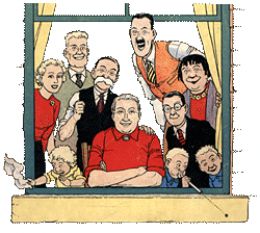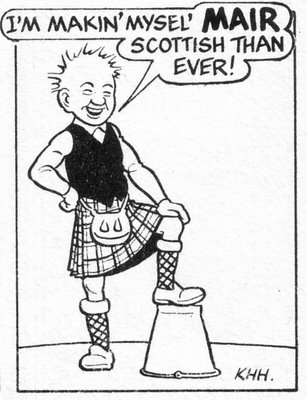|
English Language
|
Scottish Dialect
 Lallans (Lowlands) Scots has its historical roots in the same Germanic source languages as English and seems to have diverged from Northumbrian Middle English after the 14th century.
Lallans (Lowlands) Scots has its historical roots in the same Germanic source languages as English and seems to have diverged from Northumbrian Middle English after the 14th century.
“Lowland Scots … a common name for the Scottish dialects of northern English …”
Lallans: "A name for the vernacular speech of Lowland Scotland”
[Oxford Companion to the English Language]
While those looking for a truly Scots language have Gaelic, Lallan is generally seen as a dialect of English. Lallans does not appear as a separate language in either Katzner's comprehensive "Languages of the World" or Crystal's great "Encyclopedia of Language". Indeed Lallans can be read and understood fairly easily by English speakers (see examples on the pages of Lallans, the Scots Language Society.) However it was the variety used when Scotland was an independent nation and has a historic and literary heritage from Middle English onwards.
David Crystal in The Cambridge Encyclopedia of the English Language says that of all the regional varieties of English, "there are none more distinctive or more divergent from Standard English than some of those associated with Scotland." He neatly bypasses the question of whether Lallans is a dialect or a separate language by describing Lallans as a "dialect island."
He summarises the issue: "The situation, in short, is complex and unclear. However, even those scholars who debate whether to call Scots a language or a dialect end up recognizing its special status ...." He might have added that the language is iextricably linked to the identity of Scots, though this is arguably a social feature rather than a linguistic one.
Once the language of south and eastern Scotland it absorbed English vocabulary under the influence of James VI who became James I of England, and under the Acts of Union (1603 and 1707).
 It was adopted by literary figures in the 18th century and so could be read in the works of Allan Ramsay, Robert Burns and Walter Scott. From the 19th century it can be read in the writing of Robert Louis Stevenson and J M Barrie and in the 20th in the poetry of Hugh McDiarmid (Christopher Murray Grieve). However this variety, referred to as "synthetic Scots" by Mc Diarmid himself, has been described as "Scots words grafted on to a standard English grammatical structure somewhat removed from traditional spoken Scots" (Wikipedia entry for Lallans, viewed 20.07.2015.)
It was adopted by literary figures in the 18th century and so could be read in the works of Allan Ramsay, Robert Burns and Walter Scott. From the 19th century it can be read in the writing of Robert Louis Stevenson and J M Barrie and in the 20th in the poetry of Hugh McDiarmid (Christopher Murray Grieve). However this variety, referred to as "synthetic Scots" by Mc Diarmid himself, has been described as "Scots words grafted on to a standard English grammatical structure somewhat removed from traditional spoken Scots" (Wikipedia entry for Lallans, viewed 20.07.2015.)
Even more accessible are the comic creations Oor Wullie (left) and The Broons (above) drawn by Dudley Watkins and published in Scotland in The Sunday Post.
Using Scots dialect the cartoon strips are understandable (with a little extra knowledge of vocabulary) by English-speaking readers and rely considerably on vowel changes (more becomes mair), and other minor pronunciation divergences from RP written approximately phonetically to reflect the accent.
Read what Wee Ginger Dug has to say about Scots. He believes it's a language, not a dialect.
Scots vocabulary for standard English speakers: |
Now read To A Mouse by Robert Burns and consider the questions following it.
Also read The Twa Corbies.
There is a short history of the Scots language in Wikipedia.
|
|